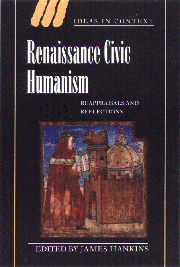Book contents
- Frontmatter
- Contents
- List of contributors
- Introduction
- 1 The republican idea
- 2 “Civic humanism” and medieval political thought
- 3 Civic humanism and Florentine politics
- 4 The two myths of civic humanism
- 5 Rhetoric, history, and ideology: the civic panegyrics of Leonardo Bruni
- 6 De-masking Renaissance republicanism
- 7 Civic humanism, realist constitutionalism, and Francesco Guicciardini's Discorso di Logrogno
- 8 Bruni and Machiavelli on civic humanism
- 9 Rhetoric, reason, and republic: republicanisms – ancient, medieval, and modern
- 10 Situating Machiavelli
- Index of manuscripts and archival documents
- General index
- Ideas in context
3 - Civic humanism and Florentine politics
Published online by Cambridge University Press: 06 October 2009
- Frontmatter
- Contents
- List of contributors
- Introduction
- 1 The republican idea
- 2 “Civic humanism” and medieval political thought
- 3 Civic humanism and Florentine politics
- 4 The two myths of civic humanism
- 5 Rhetoric, history, and ideology: the civic panegyrics of Leonardo Bruni
- 6 De-masking Renaissance republicanism
- 7 Civic humanism, realist constitutionalism, and Francesco Guicciardini's Discorso di Logrogno
- 8 Bruni and Machiavelli on civic humanism
- 9 Rhetoric, reason, and republic: republicanisms – ancient, medieval, and modern
- 10 Situating Machiavelli
- Index of manuscripts and archival documents
- General index
- Ideas in context
Summary
For forty-five years now historians have debated the arguments advanced by Hans Baron in The Crisis of the Early Italian Renaissance, and elaborated in many separate studies and essays, according to which a tenacious defense of republican liberty and an ethic of civic participation suddenly emerged among early fifteenth-century Florentine citizens and humanists as a consequence of Florence's struggle for survival against the expansionist ambitions of the Visconti dukes of Milan. Baron's thesis has enjoyed (and suffered) a degree of attention and controversy that has not abated even now, a decade after his death and in a completely transformed world of historiographical assumptions and practices. One reason for this is certainly the dramatic quality of Baron's thesis – its claim that big and lasting changes in the intellectual history of the Renaissance occurred as a direct and immediate response to what Baron saw as the Florentines' life-and-death conflict with Milan. Other reasons for the continuing debates may be less clear, less related to the merits and weaknesses of Baron's historical arguments, and rooted, perhaps, in the political agendas and ideological stakes that still surround modern versions of civic humanism. Whatever the reasons, the problem of when and why civic and republican attitudes emerged in Renaissance Florence still generates a good deal of debate.
The question of Florentine civic humanism, as understood both by Baron and most of his critics, has typically been framed around three points: the genesis, the originality, and the accuracy of the civic humanist representation of republican politics in fifteenth-century Florence.
- Type
- Chapter
- Information
- Renaissance Civic HumanismReappraisals and Reflections, pp. 75 - 104Publisher: Cambridge University PressPrint publication year: 2000
- 14
- Cited by

